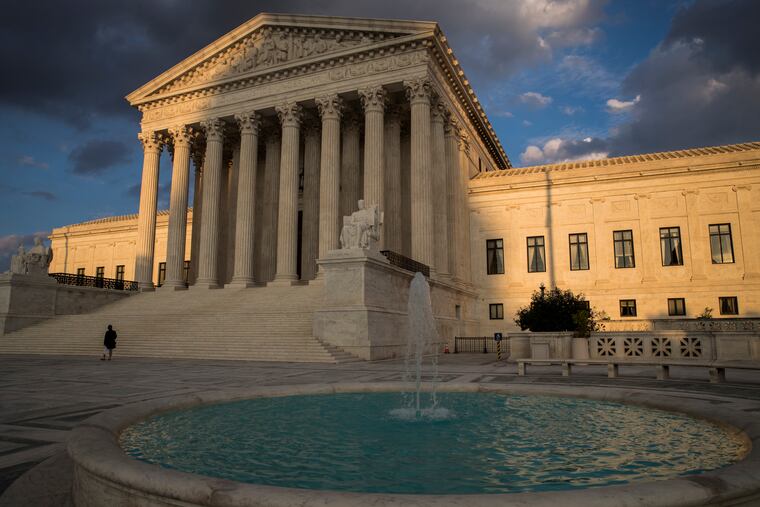Don’t make assumptions when it comes to Pa.’s redistricting fight | Opinion
When courts, even for popular reasons, assume authority that they do not have, then the protections which the Framers carefully drafted to guard us against tyranny are defeated.

We assume that judges can read, and that they have a better grasp of the constitutional framework of our government than the average layman. Then along came the majority justices of the Pennsylvania Supreme Court in the redistricting case, and proved that our assumption is wrong.
On Thursday, Pennsylvania's top two Republican lawmakers filed an appeal Thursday with the U.S. Supreme Court challenging a ruling that the state's congressional boundaries constituted a partisan gerrymander and ordered them redrawn.
One would think that a state's Supreme Court justices would know that our U.S. congressmen are not state employees and that the Pennsylvania state constitution, therefore, says nothing about them.
>> READ MORE: Pennsylvania, gerrymandered: A guide to Pa.'s congressional map redistricting fight
The Pennsylvania Constitution and laws are subordinate to the U.S. Constitution, and one would assume that a justice of the state's highest court would know that. Again, the Pennsylvania Supreme Court has demonstrated the falseness of our assumption.
One would also assume that just because a majority of the justices don't like the result that flows from the exercise of a constitutional provision, they aren't free to undo the result. Once again, the majority proved our assumption wrong.
Indeed, all of our assumptions about the ability of the justices to read, grasp, understand, and apply the law as written were shown to be wrong when they usurped the constitutional authority of the state legislature to draw congressional districts, and substituted their own map.
>> READ MORE: Pa. Senate passes anti-gerrymandering bill with 'poison pill' judicial districting amendment
The U.S. House of Representatives was created by Article I, Section 1, of the U.S. Constitution. Section 4 of Article I says: "The Times, Places and Manner of holding Elections for Senators and Representatives, shall be prescribed in each State by the Legislature thereof; but the Congress may at any time by Law make or alter such Regulations, except as to the Place of Chusing [sic] Senators."
Note that in that provision the Constitution uses the words "Legislature," "Law," and "Regulations." These words are not synonyms for the same thing. Thus, the word "Legislature" means the legislative body of the state, and does not mean "legislation," which would be "Law."
It should have been clear to the Pennsylvania Supreme Court that the U.S. Constitution was delegating to state legislatures the authority to prescribe the "Times, Places and Manner" of electing the states' representatives to Congress. That authority was not delegated to the states' judiciary. The state legislatures in exercising that authority are acting as agents of the U.S. Constitution, and not as agents of any state authority.
If one examines the Pennsylvania Constitution, one will search in vain for any provision relating to the election of members of the U.S. Congress, or of the drawing of congressional legislative districts. The Pennsylvania Constitution goes into considerable detail about the election of state legislators and state legislative districts, but not one word about federal representatives or districts. That, perhaps, explains why the Pennsylvania Supreme Court majority had to seize upon the "free and equal" provision of the Pennsylvania Constitution as the sole basis for its decision. And that provision deals with the right of suffrage, and not to the drawing of congressional district lines.
The simple fact, apparently beyond the grasp of the majority justices of the Pennsylvania Supreme Court, is that the Pennsylvania Constitution does not apply to the drawing of district lines for the U.S. House of Representatives. It is the U.S. Constitution that governs election to the U.S. House of Representatives and not the Pennsylvania Constitution.
Also ignored by the majority justices of the Pennsylvania Supreme Court is that by themselves setting aside the districts drawn by the legislature, they have usurped the authority of Congress. The Constitution is very clear that "the Congress may at any time by Law make or alter such Regulations". It is Congress, and only Congress, that may alter what the state legislature has prescribed.
When courts, even for popular reasons, assume authority that they do not have, then the protections which the Framers carefully drafted to guard us against tyranny are defeated.
Howard Lurie is emeritus professor of law at Villanova University School of Law.